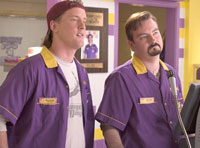Stephen King's 1977 novel The
Shining is among his best,
and the film adaptation is, for my money, THE best adaptation of a
King novel, ever. Stanley Kubrick is a famous director, but not a
particularly prolific one. I was surprised to find that his IMDB.com
entry for films he has directed only contains 13 feature films, over
a 46-year career. The story goes that Kubrick passed on the chance to
direct “The Exorcist,” which, of course, went on to become a
financial success and one the greatest horror films ever. Smarting
from that mistake, Kubrick was eager to do his own horror movie.
After separating the wheat from the chaff, he finally settled on “The
Shining.”
It's a tale of
a family falling apart. Jack Torrance takes a job as the winter
caretaker of a mountain resort, the Overlook Hotel. He and his family
will be snowed in and stuck there for the winter, but that is just
fine with Jack. A recovering alcoholic, he hopes to restart his life
and get back to his writing. 5-year-old Danny gets glimpses of the
future, which have told him to be afraid of the Overlook, while his
mom, Wendy, is just trying to hold the family together. As winter
sets in at the hotel, Danny begins seeing horrifying visions, while
Jack is losing his mind.
Stephen King
has created a lot of monsters over the years, and most of them are
human. He explores the supernatural, but central to most of his
stories is the idea that the greatest evil in this world lives in the
human heart. Even in stories like “It,” where there is clearly a
supernatural being, they usually recruit human helpers, who are only
too easy to enlist in evil deeds. This is never more true than in
“The Shining.” As Danny sees ghosts, and Jack becomes
increasingly irritable, we are left wondering if they are under a
supernatural influence, or if we are simply seeing the horror of
mental illness.
It almost feels
silly to try to list the virtues of “The Shining.” The film is
visually arresting, including beautiful views of the snow-covered
Rockies, the hotel's hedge maze, and, of course, the hotel itself.
The interior is a character in itself, including some very
snazzy-looking carpet. An example of the outstanding cinematography
occurs in the notorious room 237. We have been led to expect there
will be someone (or something) there. As Jack approaches the
bathroom, we can see that the translucent shower curtain is partly
drawn, and there is just the hint (or is there?) of a shape behind
that curtain. While your eyes are feasting on all this, the film's
score keeps you on the edge of your seat, without resorting to the
use of jump scares.
I would hold
that the performances are excellent, although there has always been
debate on that topic. Stephen King was not pleased with the casting
of Jack Nicholson. The Jack Torrance of the novel is an ordinary
person with a drinking problem and a little bit of a temper. His
impending psychosis is a very gradual and shocking process. With Jack
Nicholson's manic persona, we are just waiting for Jack Torrance to
start going nuts. It's a memorable performance, and I think a good
one, but I can see why King wanted someone more restrained, like
Martin Sheen.
I was not
bullish on Shelley Duvall the first time I saw the film. She spends a
lot of time screaming in terror, and I found her character weak and
annoying. Also, her lank hair and sexless clothing make her hard to
look at. (The Wendy of the novel is a stronger and more attractive
character.) On a second viewing, however, I feel I judged the actress
and the character too harshly. Wendy is a sweet girl just trying to
keep her family happy. In the end, the fact that she keeps fighting
to protect Danny despite being absolutely scared out of her mind
should be viewed as a sign of strength.
Other
casting choices are less controversial. Scatman Crothers is so
charming you just want to take him home! He plays the hotel chef, who
explains to Danny that his ability to see the future is called “the
shine,” and warns Danny away from room 237. As for Danny, child
actor Danny Lloyd is stellar. Oddly enough, he did not go on to have
much of an acting career, but his performance in “The Shining”
could not be improved upon.
There are lots of movies that run well
over 2 hours, and most of them, even the good ones, could stand to be
about 30 minutes shorter. Not “The Shining.” Stanley Kubrick
makes good use of every minute, building the dread and the horror
slowly. This is after all, a story of a regular guy losing his mind,
and it just isn't believable if it happens all at once. Most horror
films are in a rush to get to the nasty stuff, like a porno where the
bored housewife answers the door for the UPS guy, and next thing you
know, everybody is naked. “The Shining” is not in a rush. It
wines you and dines you and introduces you to its parents, so when
the horror comes, you are good and ready for it. If the film feels
long at all, it is not because of excess scenes, but because of the
exhausting level of dread and slowly-building horror. You can simply
feel the stress hormones pumping while you are sitting on your couch,
but then, that's what horror movies are for!
5 stars out of 5




























